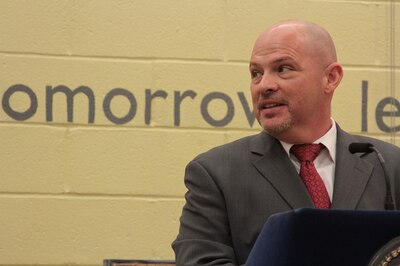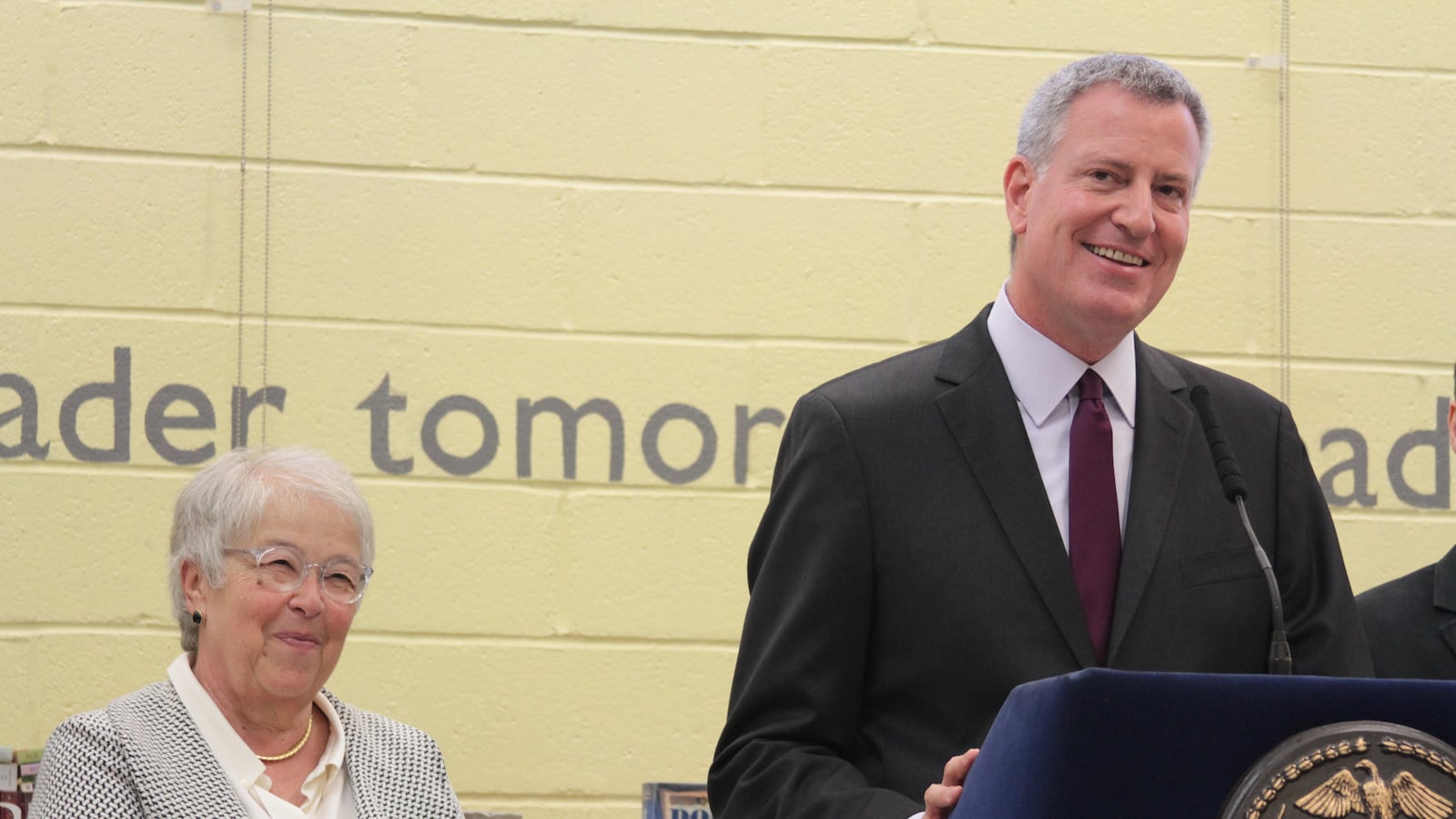A year after a few dozen schools won waivers from certain city regulations and union rules, city officials say interest in its experimental program has grown and that it remains a cornerstone of their plans to improve the school system.
Next year, 126 schools will be eligible to experiment with approved changes to class sizes, school scheduling, and teacher evaluations, up from 62 schools approved to take part in the program this year. Mayor Bill de Blasio and Chancellor Carmen Fariña announced the expansion at one of the selected schools in Staten Island Tuesday morning.
The program, called Progressive Redesign Opportunity Schools for Excellence, or PROSE, was negotiated within the teachers-union contract ratified last year. Schools had long been able to negotiate “school-based options,” which changed union rules at a specific school for one year, but PROSE offers schools more guidance and its changes last for multiple years.
“This is reform on a grand scale,” de Blasio said at Michael J. Petrides School, which is experimenting with different class sizes by creating larger, college-style seminar classes for its high school grades.
PROSE plans are approved by a panel of representatives from the education department, principals union, and teachers union, and 65 percent of each school’s unionized staff have to vote in favor, too. Whether the changes made so far have been as sweeping as de Blasio described is less clear. Many of the 62 schools selected last summer submitted elaborate innovation plans but received only provisional approval from the panel and were told to continue planning. Most of the approved schools made changes within three categories: their teacher-evaluation rubrics, their school-day schedules, and their class sizes.

This year, nearly 120 schools turned in applications to join the second cohort of PROSE – an increase from last year’s 107 applications. The contract caps the program at 200 schools participating over five years, but de Blasio said Tuesday that the city is on pace to reach 200 PROSE schools by the end of next school year and that he expects the program to continue growing.
As the program’s first year comes to a close, Fariña said the city will be measuring its success by looking at the participating schools’ state test scores and their teacher retention rates. The PROSE program is meant to encourage creative thinkers with fresh ideas — like the ones that she had as a 20-year veteran of the classroom, she said, when she developed a plan to work four days a week and work with other city educators on Fridays.
Without a PROSE-type program, the arrangement “all had to be kept hidden and private,” she said.
With just weeks left in the state legislative session, and mayoral control of the city’s schools set to expire at the end of June, de Blasio used the spotlight to again advocate for lawmakers to agree on a new law. The mayor will be in Albany on Wednesday.
“Whether you’re talking about pre-k or after-school or teacher training or parent involvement or Renewal schools or community schools or PROSE schools, they have to happen now,” de Blasio said. “They can happen now because of mayoral control of education.”
Newly-selected PROSE schools:
Bronx
- The Laboratory School of Finance and Technology
- International Community High School
- Pablo Neruda Academy
- Urban Assembly Academy of Civic Engagement
- Urban Assembly School for Applied Math and Science
- Bronx Center for Science and Mathematics
- PS 274 The New American Academy at Roberto Clemente State Park
- The Leadership and Community Service Academy
- Bronx International High School
- The Bronx School for Law, Government and Justice
- Claremont International High School
Brooklyn
- Urban Assembly Unison School
- Urban Assembly School for Law and Justice
- Academy of Arts and Letters
- The Brooklyn Latin School
- The Green School
- The Upper Academy
- PS 321 William Penn
- Brooklyn Frontiers High School
- Carroll Gardens School for Innovation
- The Math and Science Exploratory School
- Nelson Mandela School for Social Justice
- PS 249 The Caton School
- PS 770 New American Academy
- Cultural Academy for the Arts and Sciences
- Academy for Young Writers
- Spring Creek Community School
- Liberty Avenue Middle School
- School of the Future
- The Urban Assembly School for Collaborative Healthcare
- International High School at Lafayette
- Kingsborough Early College Secondary School
- Origins High School
- PS 446 Riverdale Avenue Community School
- Riverdale Avenue Middle School
Manhattan
- Bard High School Early College Manhattan
- Tompkins Square Middle School
- The Urban Assembly Maker Academy
- Urban Assembly School of Design and Construction
- NYC Lab School for Collaborative Studies
- Urban Assembly New York Harbor School
- Lower Manhattan Community Middle School
- Lower Manhattan Arts Academy
- Urban Assembly Media High School
- PS 112 Jose Celso Barbosa
- Central Park East 1 Elementary School
- Urban Assembly School for the Performing Arts
- The Urban Assembly Institute for New Technologies
Queens
- Forest Elementary School
- Bard High School Early College Queens
- Voyages Preparatory High School
- Business Technology Early College High School
- Goldie Maple Academy
- EPIC High School North
- Metropolitan Expeditionary Learning School
- Institute for Health Professions at Cambria Heights
- Benjamin Franklin High School for Finance and Information Technology
- The Young Women’s Leadership School of Astoria
- Hunter’s Point Community Middle School
Staten Island
- Michael J. Petrides School
- Concord High School


